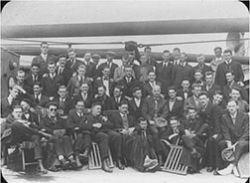
The Religious Society of Friends (Quakers) have long had a Peace Testimony -- a belief against participation in war. Many Quakers have refused to serve in the military and, like other pacifists, were persecuted, sometimes severely, for their beliefs. Yet, the Quaker peace testimony is not a passive resignation to evil, but a belief in the positive expression of love and reconciliation. As an active commitment to peace, English and American Quakers engaged in relief and reconstruction work in Europe during and after World War I.
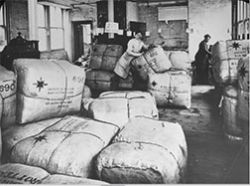
Led by British Quakers, the Friends' War Victims’ Relief Committee and the Friends’ Ambulance Unit began their efforts among non-combatants in 1914. These men and women were later joined by volunteers from the American Friends Service Committee, which was formed in 1917 when the United States entered the war. Together they provided civilian relief in France, Belgium, Russia, Serbia, Austria, and Poland, and among the "alien enemies" in Great Britain. In 1919, Quakers extended their efforts to include a program of child-feeding in war-ravaged Germany.
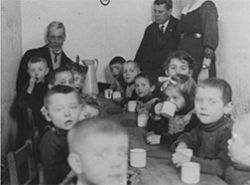
Herbert Hoover, as head of the US of Food Administration (and later the first Quaker U.S. President), collected large sums of money through various government and civilian sources. He placed these funds at the disposal of the American Friends Service Committee (AFSC). At its height in 1921, the AFSC was feeding over one million German children per day. The program was turned over to German officials in 1922.
The Swarthmore College Peace Collection and the Friends Historical Library of Swarthmore College hold digital and archival collections illuminating the work of Quaker individuals and organizations which worked for civilian war-relief during World War I and its aftermath:
Quaker Relief in Europe, 1914-1922
Friends Historical Library of Swarthmore College
This digitized collection of almost 1000 glass lantern slides illustrates the relief work in Europe of the American Friends Service Committee (AFSC), circa 1919. Used by the AFSC for educational and fund-raising purposes, these lantern slides illustrate the devastation caused by the war. Many disturbing images show malnourished, diseased children, their destitute families, and their destroyed homes and villages. They also illustrate the bravery, resilience and stoicism of the children.
American Friends Service Committee. Friends International Service Reference Files
Friends Historical Library of Swarthmore College
This digitized collection of almost 1000 glass lantern slides illustrates the relief work in Europe of the American Friends Service Committee (AFSC), circa 1919. Used by the AFSC for educational and fund-raising purposes, these lantern slides illustrate the devastation caused by the war. Many disturbing images show malnourished, diseased children, their destitute families, and their destroyed homes and villages. They also illustrate the bravery, resilience and stoicism of the children.
Nancy J. Babb Collected Papers
Swarthmore College Peace Collection
Nancy Jones Babb (1884-1948) served with the American Friends Service Committee and the American Red Cross administering relief efforts in Russia and Siberia, 1917-1919 and 1921-1928, She administered 20,000 square miles of territory with two other Quaker women.
Edward Wyatt Evans Papers
Swarthmore College Peace Collection
Edward W. Evans (1882-1976), was a Quaker leader and lawyer active in educational and peace programs of the Society of Friends. His papers include information about the Fellowship of Reconciliation members of the American Friends Service Committee Reconstruction Unit (1917-1918).
A. Ruth Fry
Swarthmore College Peace Collection
A. Ruth Fry (1878-1962) was an English Quaker peace activist and author. As a commissioner for the Friends War Victims' Relief Committee in World War I, she travelled through Europe and Russia.
E. Carleton MacDowell
Friends Historical Library of Swarthmore College
E. Carleton MacDowell (1887-1973) was a zoologist and a Quaker pacifist relief worker. This collection includes information, relating to MacDowell's involvement in Quaker relief activities in France during and after World War I.
Mildred Scott Olmsted Papers
Swarthmore College Peace Collection
In February 1919, Mildred Scott, a pacifist Quaker, went to France with the American Expeditionary Force-YMCA; as of August 1919, she transferred to the Mission Anglo-Américaine de la Société des Amis, a project of the American Friends Service Committee and the Friends' War Victims' Relief Committee (Great Britain). In early 1920, she transferred to Berlin and joined the German Unit of the American Friends Service Committee/American Relief Administration. Here, she helped organize the feeding of famine-stricken German children. The Mildred Scott Olmsted Papers include extensive correspondence about her work during this time with her fiancé, Allen S. Olmsted, and with family and friends.
William Webb Price
Friends Historical Library of Swarthmore College
William Webb Price (1892-1961) was a Quaker architect, teacher, and actor, of Rose Valley, Pennsylvania. This collection is chiefly letters written by Price to his family while serving with the Friends War Victims Relief Committee in France during and shortly after World War I, together with information relating to Quaker reconstruction activities in France.
Edward Thomas Collected Papers
Swarthmore College Peace Collection
Edward Thomas (b. 1877), a pacifist Quaker, was a chemist and chemical patent lawyer in New York City. The Edward Thomas and Margaret Loring Thomas Collected Papers include Edward Thomas's correspondence on behalf of refugees and prisoners of war, 1917-1918, through the Emergency Committee for the Assistance of Germans, Austrians, and Hungarians in Distress, a Quaker project.
Henrietta Martha Thomas
Friends Historical Library of Swarthmore College
Henrietta Martha Thomas (1879-1919) was a Quaker pacifist. Her family papers, the Anna Braithwaite Thomas Family Papers, include information about Henrietta Martha Thomas's World War I pacifist service in Germany and Austria.
Additional collections of papers and records concerning Quaker relief efforts include the following. (These collections do not yet have a digitial component and would have to be viewed at Swarthmore College.):
American Committee for Relief of German Children Collected Records
Swarthmore College Peace Collection
The American Committee for Relief of German Children was initiated by Henry T. Allen in December 1923. Charged solely with fund-raising, it worked in cooperation with the American Friends Service Committee, which undertook the task of administering post-war relief to German children.
Friends' Emergency & War Victims' Relief Committee Collected Records
Swarthmore College Peace Collection
The Friends' Emergency & War Victims' Relief Committee was established in September 1914 under its earlier name, the Friends' War Victims' Relief Committee; in October 1919 it merged with the Friends' Emergency Committee (Foreign Fund) to form the Emergency & War Victims Relief Committee of the Society of Friends. The General Secretary of the London-based Committee was A. Ruth Fry.
Emma Chandler MacClelland
Friends Historical Library of Swarthmore College
Emma Chandler MacClelland was a Quaker involved in relief work in France during World War I with the American Friends Service Committee.
Barbara Addison, Librarian, Swarthmore College Peace Collection and Friends Historical Library of Swarthmore College.
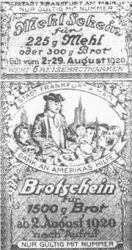
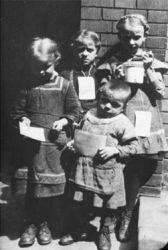
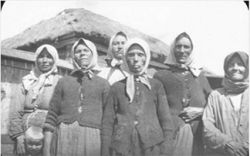
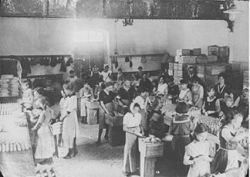
Conscientious Objection During World War I
Opposition to the War in the United States
Peace Congresses Leading Up to World War I
Women Peace Activists During World War I


